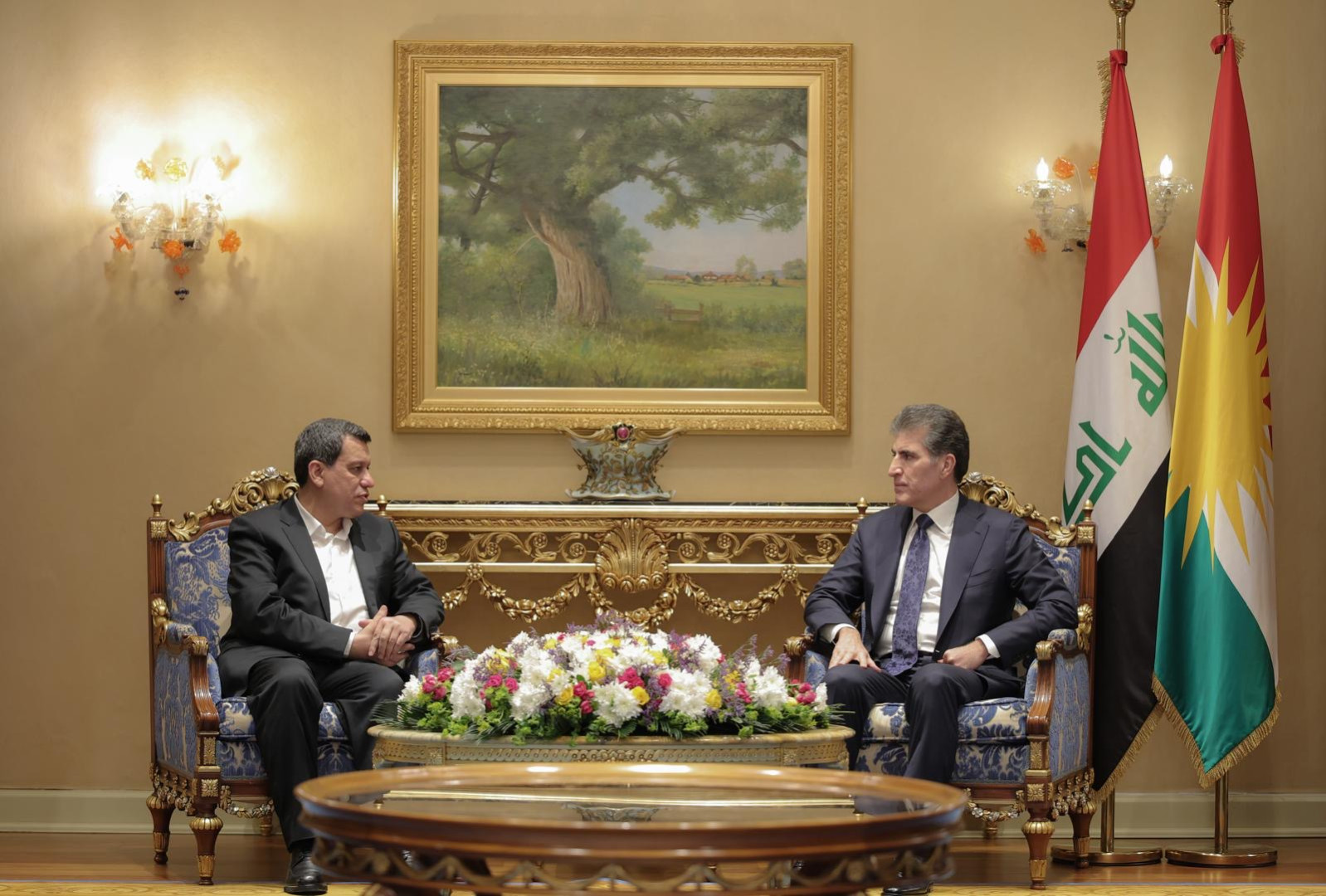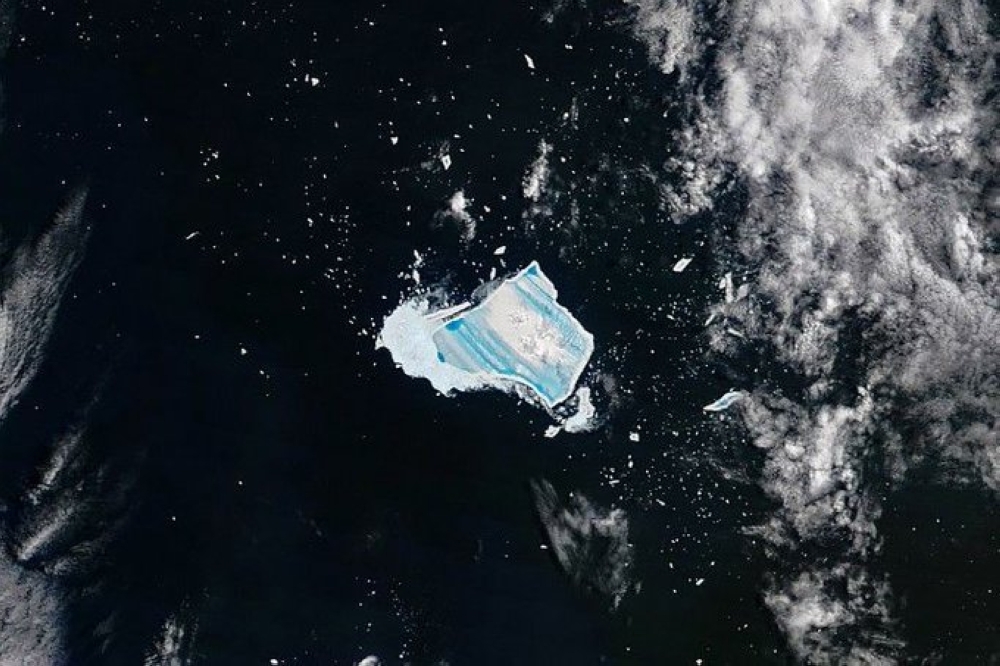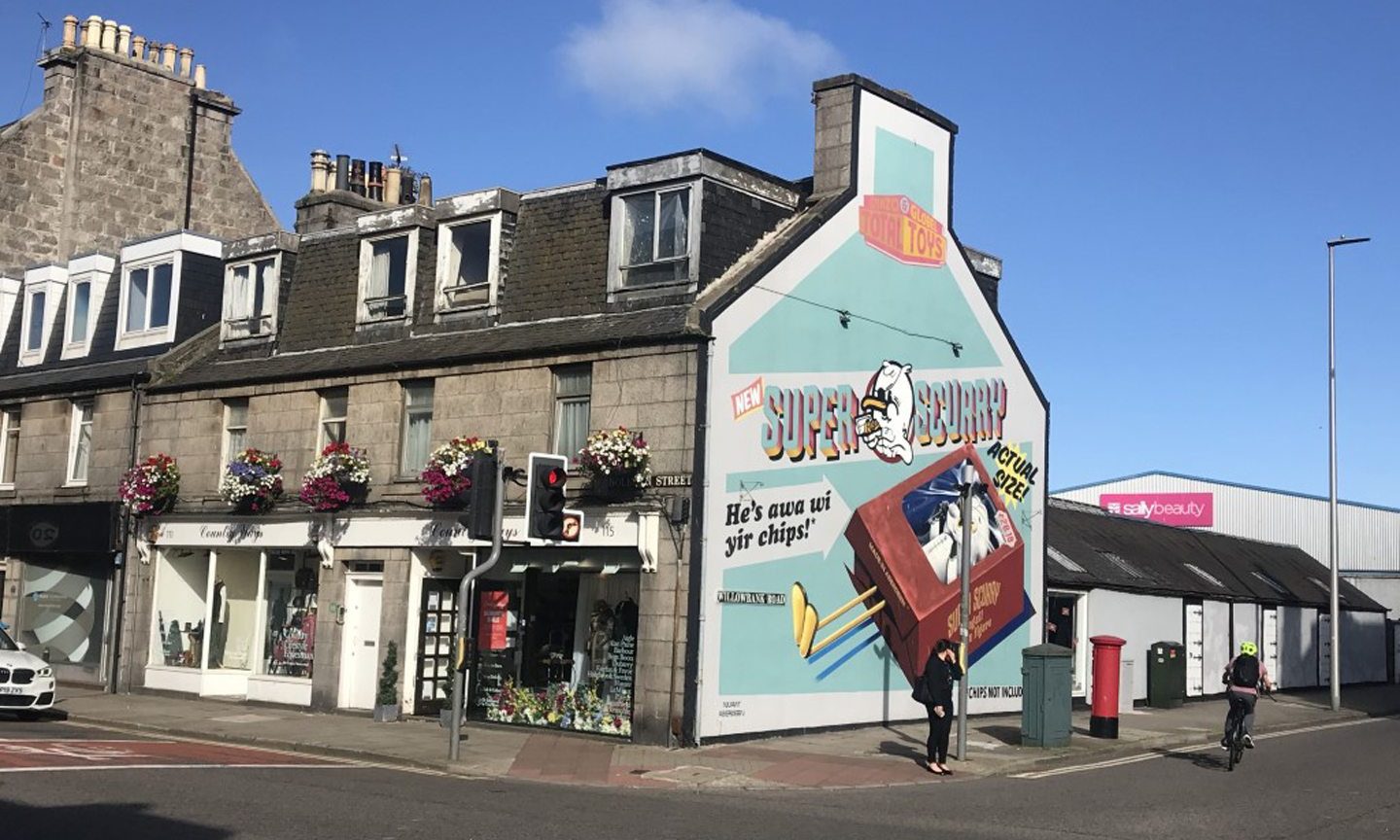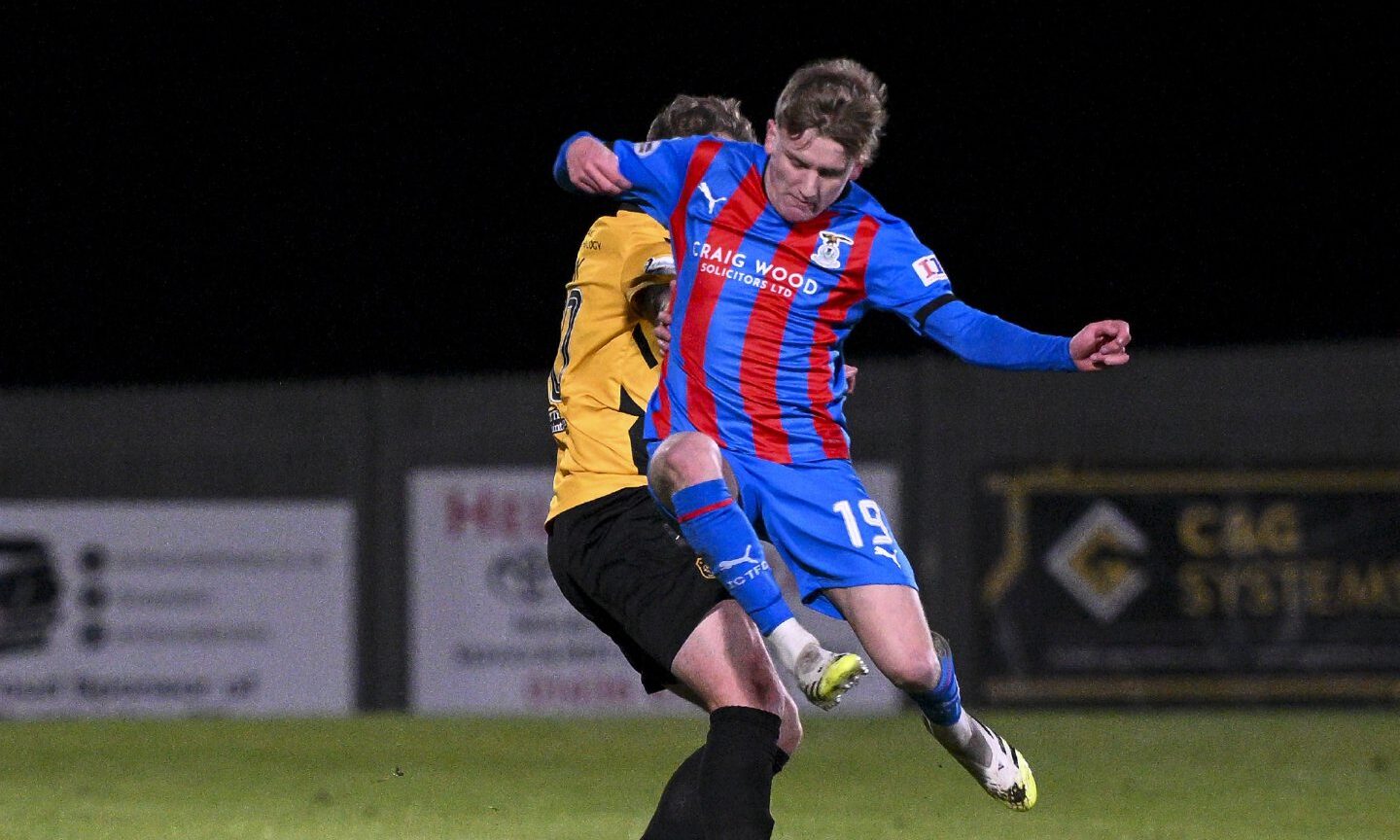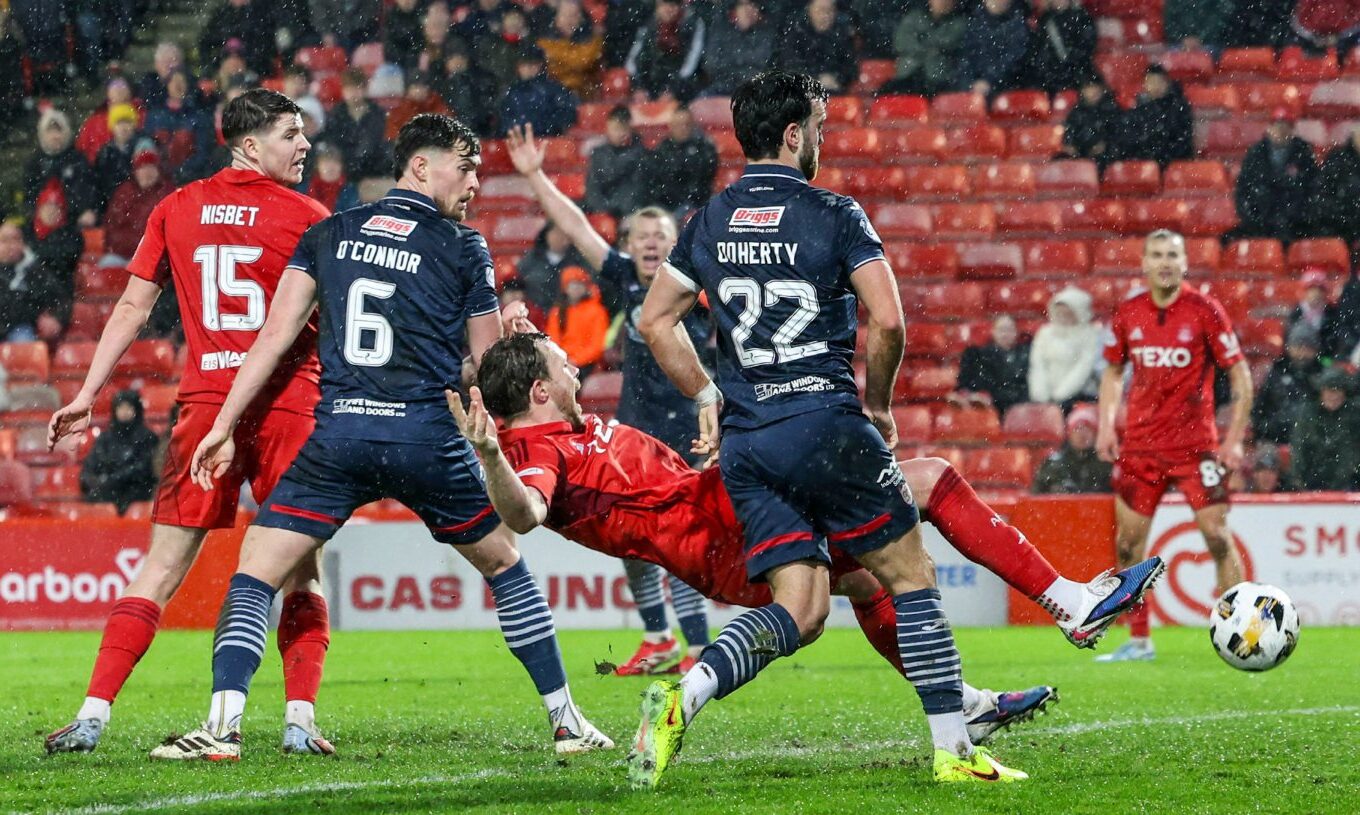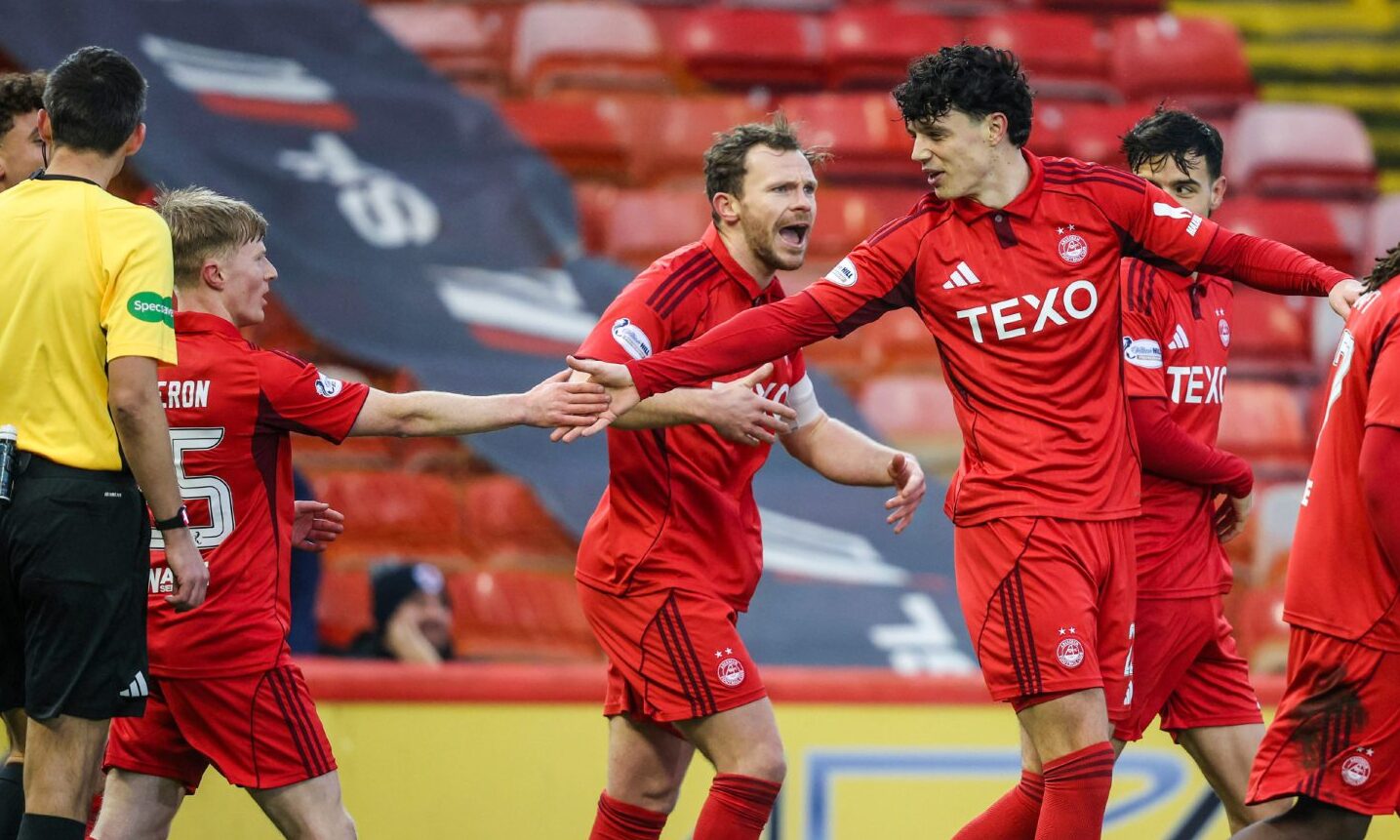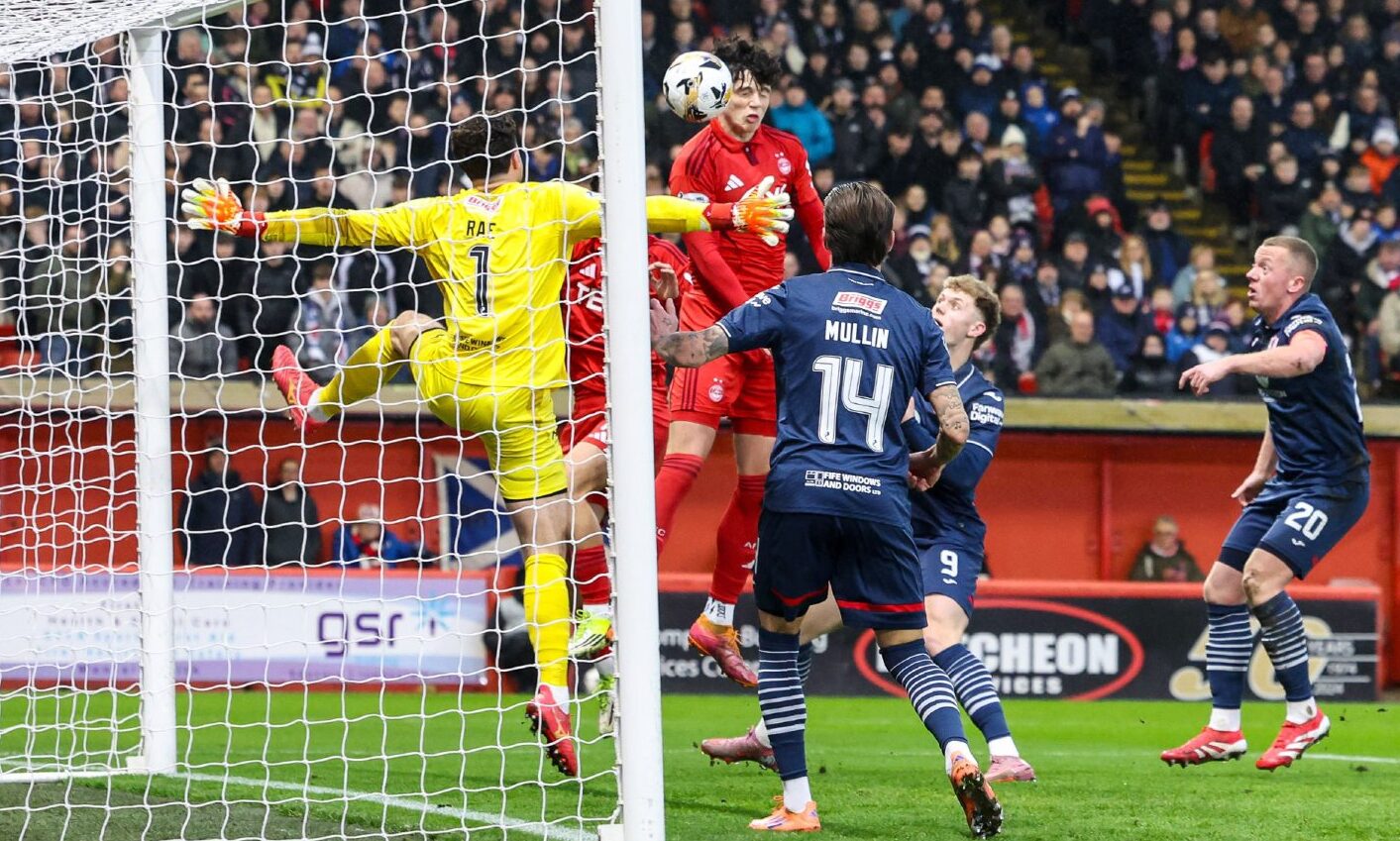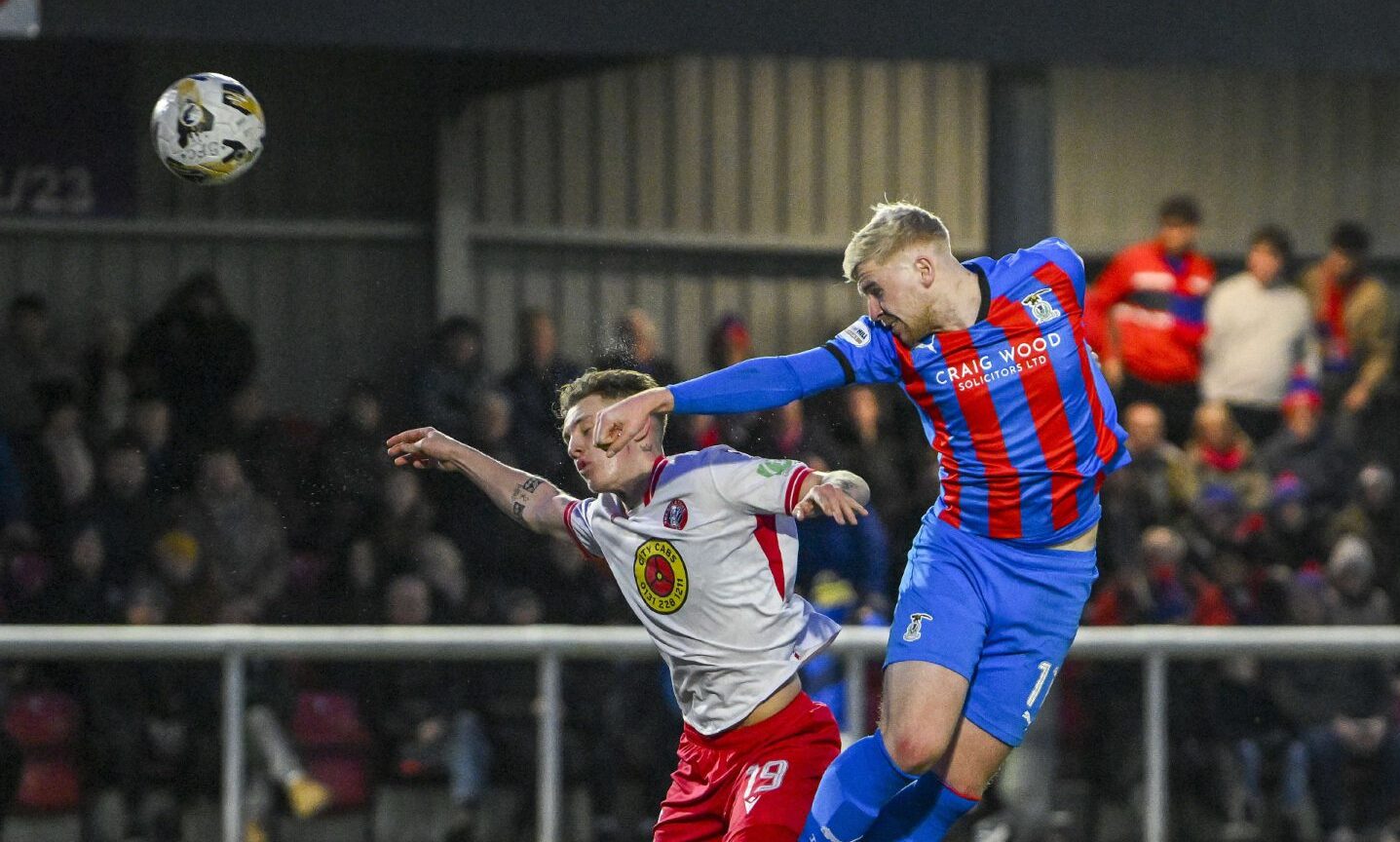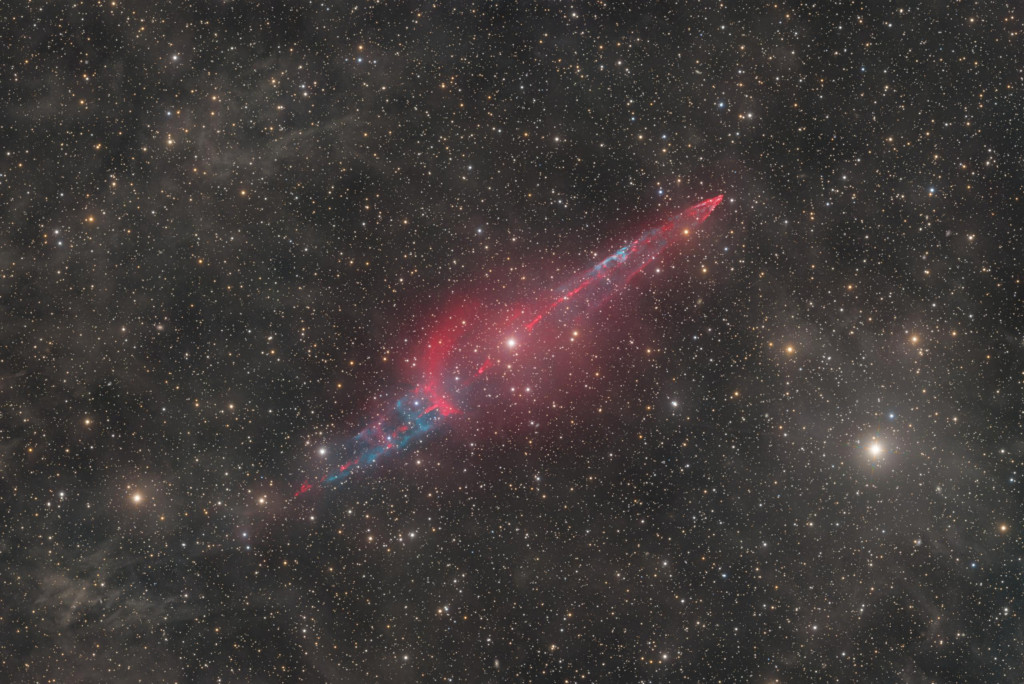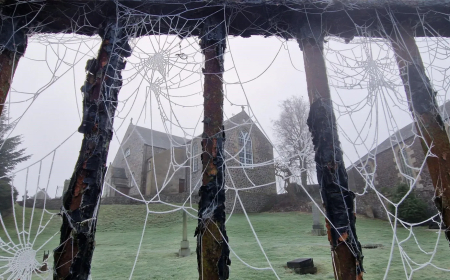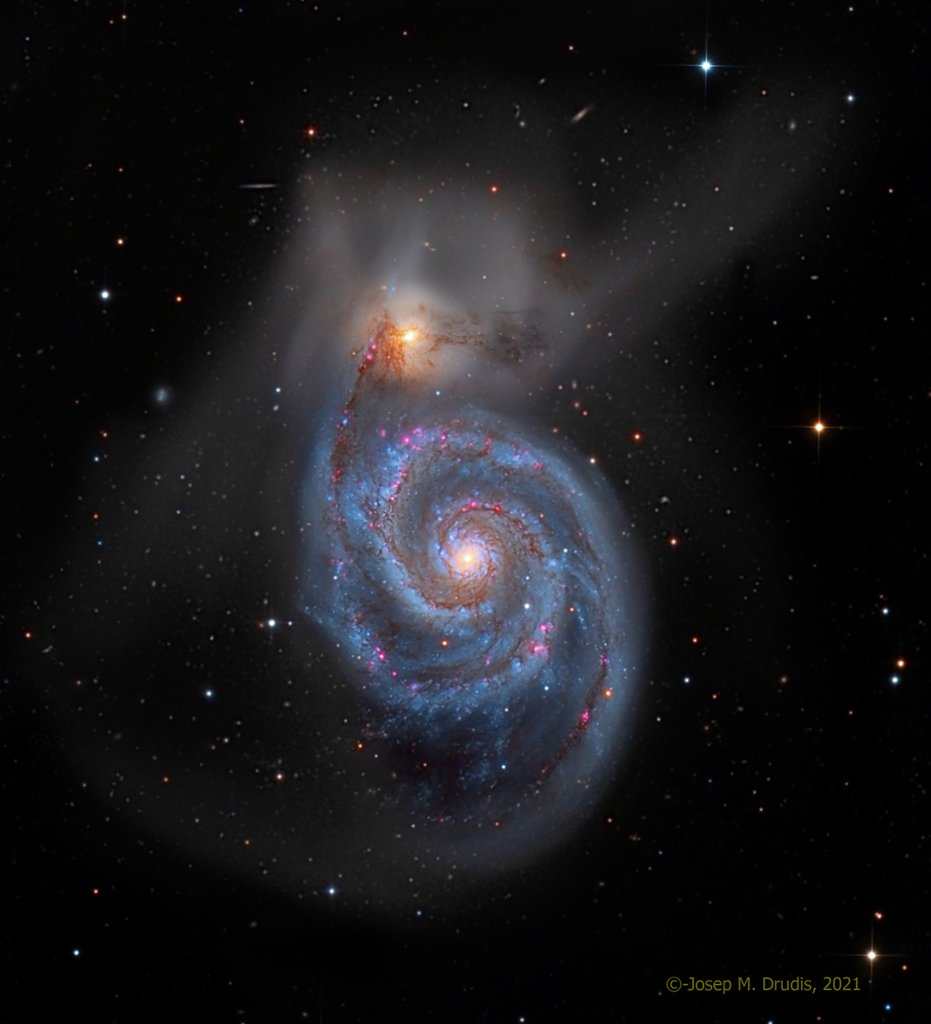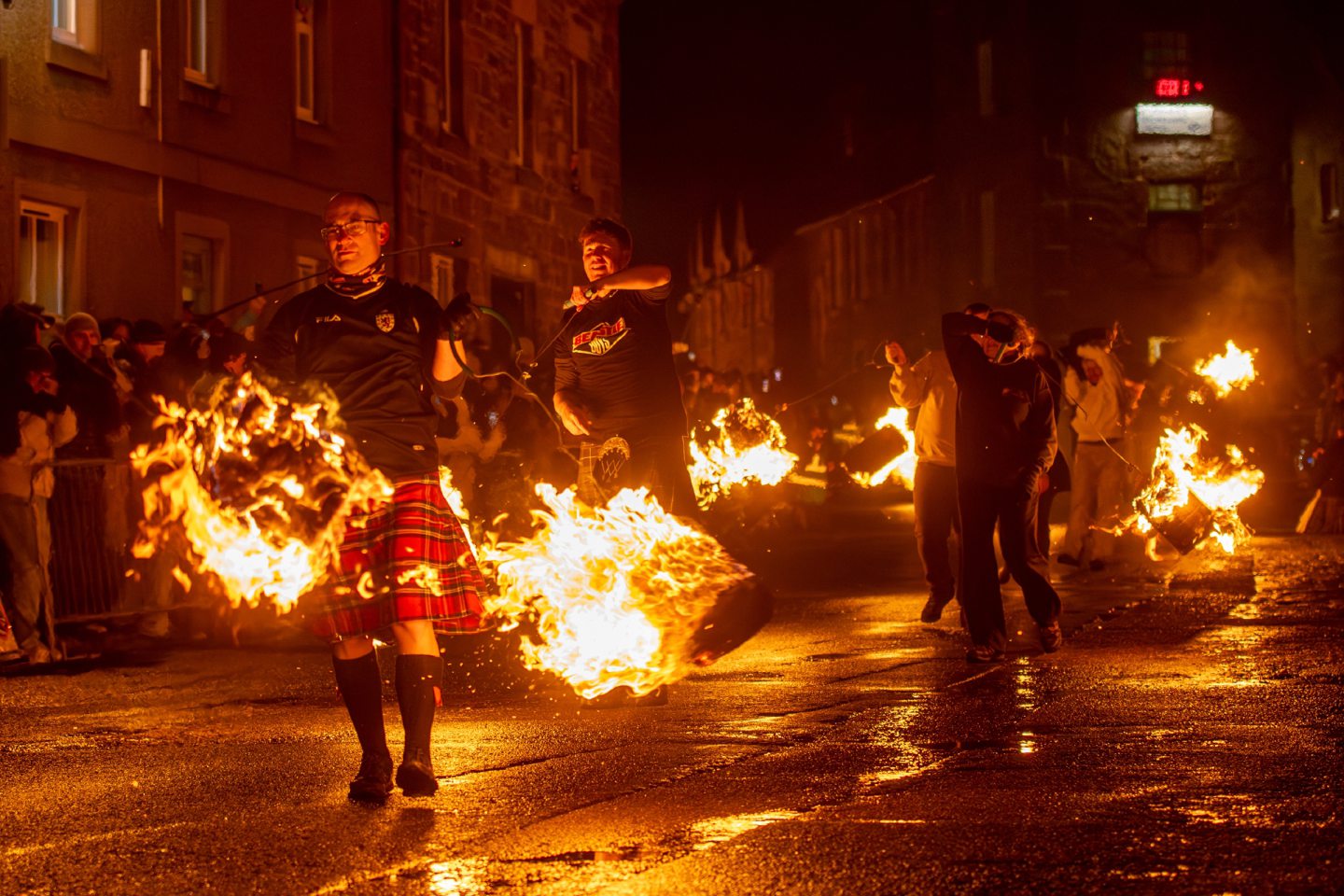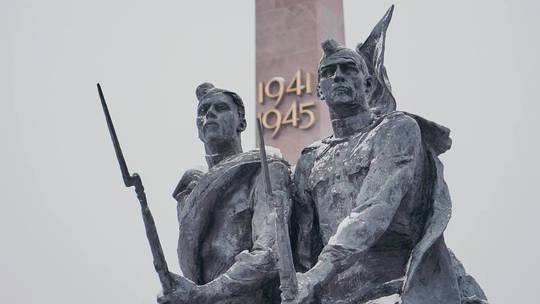The Cocaine Kingpin Living Large in Dubai
Daniel Kinahan, an Irish drug dealer, commands a billion-dollar empire from the U.A.E. Why isn’t he in prison?

The Burj Al Arab, which opened in Dubai in 1999, has often been called the world’s only seven-star hotel. The rating is unofficial—hotels are generally ranked from one to five stars—but it befits the de-trop vibe. The building, which was constructed by an army of migrant workers, is shaped like a billowing spinnaker and rises on a man-made island off the coast. Half an acre of gilt adorns its interior. There’s a restaurant surrounded by an aquarium—a portion of beluga caviar costs seven hundred dollars—and a helipad upon which Roger Federer once played tennis against Andre Agassi.
In May, 2017, Daniel Kinahan and Caoimhe Robinson, both Dubliners, were married at the hotel. The groom—short and burly, with thinning dark hair and eyes like coal—was weeks from his fortieth birthday. The bride was in her mid-thirties, with bottle-blond hair and ice-white teeth. One can assume that the toasts skipped lightly over the newlyweds’ previous relationships. Robinson’s former partner Micka (the Panda) Kelly was murdered in 2011, in Dublin, by an assassin, who shot him fourteen times before reversing a car over his body.
Underneath a giant chandelier in the ballroom of the Burj Al Arab, the couple sat on thrones, surrounded by a colorful crowd of family, friends, and business associates. One of the revellers was Tyson Fury, the six-foot-nine former heavyweight champion of the world. He has sometimes worked with Kinahan—a boxing impresario who is also known, to law-enforcement officials, as the head of the Kinahan Organized Crime Group. (Although social media was banned at the wedding, Fury reportedly tweeted about his attendance before deleting the post.) Other guests included some of the most powerful cocaine traffickers alive. Among them were Ridouan Taghi, a Moroccan Dutch man responsible for several murders in the Netherlands; Edin Gačanin, a Bosnian Dutch man who led the Tito and Dino cartel; Ricardo (El Rico) Riquelme Vega, a major Chilean drug importer; and Raffaele Imperiale, a debonair Italian linked to the Camorra. Shortly before the wedding, Italian police found two stolen van Goghs—“View of the Sea at Scheveningen” and “Congregation Leaving the Reformed Church in Nuenen”—at the home of Imperiale’s parents, near Naples.
When major criminals gather in the same room, cops tend to pay attention. The U.S. Drug Enforcement Administration had long been interested in Kinahan. One of the agency’s informants attended the wedding, as a guest. This person mapped out the constellation of gangsters at the ceremony, and provided a video of the event to American agents. The surveillance helped investigators ascertain that these men, most of whom lived in Dubai, were working together to launder money and smuggle cocaine from South America to Europe. The D.E.A. shared its intelligence with international agencies. Soon, journalists and police in Europe began calling the group the Super Cartel. Europol analysts estimated that the network controlled a third of Europe’s cocaine trade, which was worth as much as twenty billion dollars a year. An Garda Síochána, the Irish police force, recently estimated the Kinahans’ wealth to be about a billion dollars.
Most of the Super Cartel’s top members have since been brought to justice. Taghi was arrested in Dubai in 2019 and deported to the Netherlands, whose ports have become drug-trafficking hubs. He stood trial and was sentenced to life in prison, in a courthouse so heavily fortified that it is known as the Bunker. (Despite the security precautions, the brother and the lawyer of a state’s witness, as well as the Dutch crime journalist Peter R. de Vries, were murdered during the proceedings.) Gačanin was arrested in Dubai in 2022, as part of a transnational effort known as Operation Desert Light. The next year, he was convicted by a Dutch court; Gačanin later made a deal with prosecutors in which he was sentenced to seven years in prison and forced to pay a million-euro fine. Riquelme is also imprisoned in the Netherlands; he was sentenced to eleven years. Imperiale was apprehended in 2021 and later deported to Italy, where he is now incarcerated.
But Kinahan—who, through his lawyer, declined to comment for this article—remains at large in Dubai. In April, 2022, the Kinahan Organized Crime Group was sanctioned by the U.S. Department of the Treasury’s Office of Foreign Assets Control, which compared the group to “Mexico’s Los Zetas, Japan’s Yakuza and Russia’s ‘Thieves In Law.’ ” The U.S. Ambassador to Ireland announced that a five-million-dollar reward would be given for tips leading to the arrest of Kinahan; his father, Christy Kinahan, Sr.; or his brother, Christy Kinahan, Jr. But, according to a former D.E.A. agent, American law enforcement cared about only one Kinahan. As the agent put it, “It’s all about Dan.”
Portlaoise Prison, which is in the center of Ireland, is a nineteenth-century penitentiary built like a fortress—a one-star establishment, at best. In 1997, twenty years before the Dubai wedding, Christy Kinahan, Sr., was imprisoned in a rodent-infested block called the E Wing. Inmates slept one to a cell and urinated in buckets.
Kinahan, Sr., grew up in a middle-class family in Dublin. He became involved in petty crime at a young age, initially check fraud. Well-dressed, and able to affect a refined Anglo-Irish accent, Kinahan, Sr., was an adept con man. All criminals love nicknames, but the Irish do them best: the Penguin, the Viper, Fatso. Kinahan, Sr., became the Dapper Don.
In the late seventies, heroin began ravaging Dublin’s inner-city projects. A man named Larry Dunne was the city’s first godfather of heroin importers, but he was jailed in 1985. Kinahan, Sr., seeing a business opportunity, filled the gap. A sharp young detective, Michael O’Sullivan, noticed him. “There was somebody new in the market, and it just didn’t fit,” O’Sullivan told me. “Often, people in the heroin business get messy. They know the heroin trade because they use heroin.” But, in O’Sullivan’s opinion, Kinahan, Sr., wasn’t a dope fiend, and he ran an efficient business.
One day in 1986, O’Sullivan disguised himself as an electrician and followed Kinahan, Sr., to his apartment, where he caught him with a large quantity of heroin. The police later found other contraband, as well as various language-studies cassettes—Kinahan, Sr., was teaching himself French and Arabic. He was convicted of heroin possession, jailed for six years, and released in 1992. Months later, he was caught with stolen checks. The arresting officer told me that Kinahan, Sr., was an “impressive, kind of intelligent guy—no aggression.” After the arrest, Kinahan, Sr., was granted bail, then vanished.
By the mid-nineties, Irish organized crime had outgrown the country’s policing capacity. Drugs were pouring in; kidnappings and bank jobs were being perpetrated with seeming impunity. In 1996, a crime journalist, Veronica Guerin, was shot dead by a member of a gang that she’d covered, the Gilligans. The public outrage that followed led the Irish government to establish the Criminal Assets Bureau, which allowed lawmakers to seize money and property from convicted criminals.
The formation of the bureau, however, had an unintended consequence: it turned some Irish criminals into international potentates. Many Dublin mobsters moved to Amsterdam, which at the time was not unlike the cantina in “Star Wars”: a place where an assortment of major villains could freely hang out, exchange contacts, and collaborate. Kinahan, Sr., became one such expat. Another was John Cunningham, who’d been jailed, in 1986, on a kidnapping charge; he’d escaped from a prison south of Dublin in 1996. Cunningham and Kinahan, Sr., began working together, transporting heroin, cannabis, cocaine, Ecstasy, and guns to Ireland. During the same period, the Dutch police caught Kinahan, Sr., with a cache of drugs and weapons, and imprisoned him for a year. Upon serving his sentence, he went back to work. In 1997, Kinahan, Sr., returned to Ireland to attend his father’s funeral, where he was arrested for the check fraud that had led him to skip bail four years earlier. He wound up in Portlaoise.
David McDonald was a prison guard on the E Wing when Kinahan, Sr., arrived. He remembers an inmate unlike any other he has encountered. Kinahan, Sr., then forty years old, dressed smartly, in slacks and a buttoned shirt; he rarely socialized or exercised with other prisoners, and was never caught with alcohol or drugs. If a riot broke out, he stayed in his cell. When he did interact with other prisoners, he played the role of consultant: people came to him about legal issues, even though he had no formal training. Meanwhile, Kinahan, Sr., took Open University courses in Spanish, Russian, and Dutch. It was McDonald’s job to provide him with his educational materials.
“This guy had a plan from Day One,” McDonald recalled. “I don’t admire him at all, but I have to sort of take my hat off to him.” The only contraband ever found in Kinahan, Sr.,’s possession was a cellphone—the first one that McDonald can recall being smuggled into Portlaoise. In 2001, Kinahan, Sr., was offered early release, for good behavior, but he refused it because he was two months away from finishing one of his Open University courses. He felt that he’d focus better on his studies if he remained inside. Only after finishing the class did he leave. “I’d never, ever heard of any prisoner refusing early release,” McDonald said, laughing.
O’Sullivan, the detective, told me that Kinahan, Sr., was “a very strategic mercenary” who “learns from his mistakes” and is “cold and calculating.” McDonald was similarly struck by Kinahan, Sr.,’s froideur. “You wouldn’t crack a smile out of him,” he said. “He’s not what you’d call a nice guy. Most prisoners, if you get to know them somewhat, you can have a bit of a laugh with them about something—Man United, whatever it might be. But not him.”
The Kinahan brothers are the sons of a woman named Jean Boylan, who once worked as a cleaner in south inner-city Dublin. She and Kinahan, Sr., split up when the children were young; the boys stayed with their mother. Boylan was never involved in crime, except for a regular cleaning job at the local police station. A detective who worked in the building said that, though everyone knew about her family connections, she was well liked.
Boylan lived in the Oliver Bond flats, a drab, mold-ridden housing project near the Guinness factory. Crime has long flourished there. In a recent narcotics trial in Dublin, the housing project was described as “obviously a good place to sell drugs.” Boylan didn’t want her boys to enter their father’s profession. They felt his pull anyway. As Kinahan, Sr., was establishing himself in the Netherlands, Daniel was in his late teens. According to several sources, he began running drugs in Dublin for his dad’s group.
Noel Browne recently retired as a detective inspector and a senior investigations officer with An Garda Síochána. He never met Daniel Kinahan during those years of underworld apprenticeship, but he frequently interviewed people who knew him well. Browne came to think of Daniel as a peacock with nepo-baby vanities. “His associates would say, ‘Yeah, he’s an arrogant fuck,’ ” Browne told me recently. “He had a whole bunch of hoodlums around him. He would always have the best clobber”—clothes. “On one level, he had a superiority complex. But he also felt that his peers in the criminal networks would see him as somebody that got it easy, that didn’t have to come up the hard way. Every so often, Daniel would get paranoid and try to establish his authority.”
Whereas Daniel was pugnacious, Christy, Jr., who was three years younger, was a quieter type. He was being groomed for a more academic duty in his father’s organization: money laundering. In “The Cartel,” a 2017 book about the Kinahans by Stephen Breen and Owen Conlon, the authors write that the Irish police occasionally searched Jean Boylan’s apartment, and that “Daniel would make a point of seeking confrontation” while “Christopher, Jr., would be courteous.”
The boys understood the division of labor implicitly. One evening, according to Breen and Conlon, Daniel advised his brother to watch a TV documentary about money laundering, to brush up on his skills. Daniel, meanwhile, forged ties with other criminal groups in Dublin—in particular, the Hutches, who ruled the projects of the north inner city.
After being released from Portlaoise, in 2001, Kinahan, Sr., moved his base to the Costa del Sol, in Spain, which had become the favored spot for the old Amsterdam coterie. According to Nicola Tallant, an Irish journalist and the host of the podcast “Crime World,” who has covered the Kinahans for decades, “you absolutely had to have a footprint on the Costa” if you wanted to be considered a serious organized-crime group in Europe. Spain was ideally situated for the Kinahans’ cannabis trade, which imported its product from Morocco. More important, there were networking opportunities. “On the Costa, it is business and pleasure,” Tallant told me. “A melting pot of mafias . . . from all over Europe. Both Mexicans and Colombians also have their representatives there, vying for business partners.”
The Kinahan sons soon followed their father to the sunshine, and they ran their business mostly undisturbed by Spanish law enforcement. The British police, however, were given an indication of Daniel’s ruthlessness. He had become involved in a betting syndicate in which people wagered large sums on horse races in the U.K. Often, the bettors would be “laying” horses: staking money on them to lose. On May 15, 2004, the champion jockey Kieren Fallon won the Lockinge Stakes while riding the favored filly, Russian Rhythm. Evidently, the result displeased Kinahan’s syndicate, which seemed to have expected the horse to lose. On May 26th, Daniel flew from Spain to England and met up with three other members of the betting syndicate. At 1 a.m., they drove to Fallon’s home to confront him. Suddenly, they realized that they were being surveilled by an unmarked police car. They turned back.
The police soon arrested the syndicate’s head, Miles Rodgers, along with several others, for being part of an alleged race-fixing ring. The ensuing court case fell apart because some expert evidence was flawed. In 2009, however, in a separate hearing, it was proved that some jockeys had submitted to pressure from Rodgers. (Fallon wasn’t among them; his win percentage actually rose during the suspicious period, costing the syndicate hundreds of thousands of dollars.) Rodgers was permanently banned from U.K. racetracks for “wholesale corruption.”
Kinahan wasn’t a defendant in that court case. Nevertheless, the process exposed evidence that pertained to him. Intercepted phone calls were played to the jury, including one in which Rodgers said that he’d met many “menacing” people in his life, but nobody as frightening as Kinahan. He was, Rodgers said, “only a little fella—but you know when you’ve been spoken to.”
In the twenty-first century, Europe’s cocaine market has expanded dramatically, far outrunning those for heroin and synthetic drugs. A 2021 paper by the think tank InSight Crime showed that this boom was generated in part by Colombian cartels, whose supply routes into North America had been taken over by Mexican organizations. For the Colombians, Europe represented a fertile and relatively untapped user base, and they began making connections with crime groups across the Atlantic.
Michael O’Sullivan, the detective who arrested Kinahan, Sr., for heroin possession in the eighties, said that the Kinahans sensed this market shift early. In 1982, O’Sullivan made Ireland’s largest single seizure of cocaine up to that point: a hundred and ten grams. Two decades later, the drug was entering Irish ports by the ton. O’Sullivan said, of this era, “All of the criminals are buying coke, coke is king, while the economy in Europe, and in Ireland, is improving.” Unlike heroin, “coke went through all strata of society—people were building empires on coke.”
In Spain, the Kinahans’ enterprise grew large enough that governments finally began paying attention. In 2009, Daniel was named in a diplomatic cable sent from the U.S. Embassy in Sierra Leone, which was later published by WikiLeaks. He was described as “an Irish businessman involved in narcotrafficking throughout Europe.” The cable suggested that he might be “expanding his network to West Africa.”
As the business grew, Kinahan, Sr., professionalized his troops. The group paid for anti-surveillance training for its members. Spanish police files indicate that the Kinahans also gave instruction on hostage situations, target shooting, and martial arts. In “The Cartel,” the authors note that a Spanish team who listened in on such war games struggled to parse the Kinahans’ inner-city accents. In their transcripts, “first aid” is written as “forced aid.”
Among the problems that come with expanding a narcotics business is determining how to hide the proceeds. The drug trade remains, for the most part, a cash enterprise. By a conservative estimate, the Kinahans were turning over tens of millions of dollars annually. Pablo Escobar is said to have buried his mountains of banknotes in the ground, but Kinahan, Sr., put his money to work. He set up dozens of legitimate companies—in real estate, automobiles, the food-export sector—to absorb the excess of cash with which his organization was laden. He bought properties in Belgium, where he also lived for stretches of time, and registered companies in Cyprus. Some of the Kinahans’ businesses had a dual role: according to an E.U.-funded Transcrime report, a food import-export company based in Ireland was used to import drugs from Spain.
The Spanish police had done little to rein in the Kinahans. An Irish police source told me that his Spanish counterparts had scant interest in the Kinahans, or in any other Irish crime group operating in Spain. The officer summarized their view: “We have every sort of mafia here, and the Irish guys keep their head down.”
But violence is unignorable. In 2008, Paddy Doyle, a muscle-bound gun for hire who’d recently been working with the Kinahans, was assassinated in the Spanish town of Estepona. Doyle was riding in a BMW being driven by Gary Hutch—a nephew of the Hutch gang’s patriarch, Gerry—when a gunman fired several shots into the car, causing a crash. Doyle was then executed, at point-blank range. Hutch escaped unharmed. Newspapers reported that Doyle died because of a disagreement with Russian gangsters. But, according to Spanish police files, Doyle’s murder was ordered by the Kinahans, who thought that he had crossed them; more chillingly, it was rumored that Gary Hutch had set him up to be killed, as a show of loyalty to the Kinahans. (Hutch was nevertheless a pallbearer at Doyle’s funeral.)
Doyle’s murder became a catalyst for Operation Shovel, a sweeping investigation of the Kinahans in which Spanish law enforcement collaborated with several international police forces. In May, 2010, in a series of dawn raids in Spain, Ireland, and the U.K., Kinahan, Sr., his two sons, and more than thirty other alleged gang associates were arrested. In a BBC documentary, one of the Spanish officers who arrested Daniel said of him, “He was a little uncoöperative. . . . Not a nice person at all.” Kinahan, Sr., however, politely told officers that it had been unnecessary to break down his door—if they’d rung his bell, he would have welcomed them in.
A hundred and eighty bank accounts associated with the group were frozen, and dozens of properties on the Costa del Sol, among other assets, were seized. The police had found evidence not only of a network ferrying cocaine from South America to European ports but also of a sophisticated money-laundering organization worth hundreds of millions of euros—an enterprise rivalling the narcotics business in its size. The Kinahans, they said, were also offering laundering services to other criminals, for substantial fees.
The agencies behind Operation Shovel were triumphant. The head of the U.K.’s Serious Organised Crime Agency said that the operation had dealt the group “a major blow.” Dermot Ahern, Ireland’s justice minister, declared, “No border will protect those involved in organized crime.”
The Kinahans soon tested the strength of that assertion. Following the 2010 arrests, Kinahan, Sr., his sons, and their closest associates were held for only a few months before they were released without charges. Some minor players in the organization were punished for passport fraud or illegal gun possession. But the Spanish police, despite having surveilled the group for two years, hadn’t garnered enough direct evidence of drug trafficking by the Kinahans to proceed to trial.
Still, Operation Shovel marked a turning point for the Kinahans. After the arrests, power shifted toward Daniel. For one thing, his father was extradited to Belgium, where he faced money-laundering charges. (He’d failed to show the Belgian authorities legitimate sources of income, even though he had bought a casino and other costly ventures there.) Kinahan, Sr., served a two-year sentence in Belgium, and the government confiscated property worth two and a half million euros. Meanwhile, Daniel built the network of criminals—most of them Dutch residents—that became the Super Cartel.
Chris Urben investigated European drug cartels for the D.E.A. from 2012 until his retirement, in 2022. He said that the agency viewed the Kinahan crime group as unusually “difficult to penetrate.” Normally, within a network that is operating between South America and Europe, there are weak points: someone to wiretap, or to cultivate as a source. But after Operation Shovel the Kinahans learned to be very careful about how they communicated with one another. They switched to private encrypted phone networks, and—as the Spanish police would soon learn—they were brutal with informants.
Despite these obstacles, Urben told me, “there was certainly an effort to insert a source that could develop evidence for us.” Eventually, some intelligence seeped out. The Kinahans and the other Super Cartel members were forming joint-investment partnerships on cocaine shipments to European ports. By sharing profits, the Kinahans mitigated their risk if shipments were seized. “It was only a few groups that would come together in that way,” Urben said. The most successful narco-traffickers, he noted, were those who learned to collaborate.
As the Kinahans’ business expanded, they sought new ways to launder cash. One outlet was Hezbollah, the Iran-backed Lebanese militia. By then, Hezbollah had entered the cocaine trade, especially in the Netherlands, whose vast port in Rotterdam, with its endless shipping containers, offered a reliable way to sneak drugs into Europe.
Jack Kelly was a D.E.A. agent during this period, and he focussed on the relationship between Iran proxies, such as Hezbollah, and organized crime. “Hezbollah was really good at two things—transport logistics and money-laundering mechanisms,” he said. “If you wanted a guaranteed amount of money laundered back to Latin America, you’d go through Hezbollah.”
Kelly said that the Kinahans often worked with a powerful Hezbollah operative whom he called the Ghost. (The operative was connected to the Kinahans through a Dutch criminal named, unimprovably, Mink Kok.) According to Kelly, the relationship between the Ghost and the Kinahans became close enough that, in 2015, the Irish group did Hezbollah a favor: it arranged the assassination of a fifty-six-year-old Iranian electrician living under a false identity in Almere, a sleepy town in the Netherlands. The regime in Tehran believed that, in 1981, the electrician, Mohammad Reza Kolahi—then a student and a member of an Iranian dissident group—had planted a bomb at the Islamic Republican Party’s headquarters, killing seventy-three people. He fled the country, but was sentenced to death in absentia.
The Kinahan link to the murder wasn’t immediately obvious. But, a few months after Kolahi was killed, Irish police executed a search warrant on a Dublin apartment linked with the Kinahan gang. There, they found a corpulent Dutch Moroccan gangster, Naoufal (the Belly) Fassih, who spoke broken English, carried two fake I.D.s, and wore a watch worth tens of thousands of dollars.
Various e-mails sent by Fassih from Dublin were later decrypted by the Dutch police. In one, Fassih approached a gunman about killing Kolahi, saying, “Got a nice job for you.” The price for Kolahi’s head: a hundred and thirty thousand euros. Kelly told me that Hezbollah had asked the Kinahans to kill Kolahi, and that the Kinahans then outsourced the work to Fassih. Later, Fassih attended Daniel Kinahan’s wedding.
As international as the Kinahans became, they couldn’t escape their rivalrous Dublin roots. After Operation Shovel, the alliance between the Kinahans and the Hutches fractured. The reasons for the feud are somewhat opaque, but the Kinahans apparently suspected that Gary Hutch was an informant for the Spanish police. In 2014, graffiti appeared in Dublin saying “Gary Hutch U Rat.” Gary’s uncle Gerry organized a peace meeting between his nephew and Daniel Kinahan. Gary agreed to pay the Kinahans two hundred thousand euros to atone for various misdeeds, including a nonfatal shooting of a Kinahan associate. Gary’s brother also submitted to a “punishment shooting,” whereby he was shot in the leg. It wasn’t enough. In September, 2015, Gary was assassinated outside his home in Marbella, Spain.
In recent years, Gerry Hutch has become a more public figure in Ireland. In 2024, he narrowly lost an election to become a member of the Dáil, the lower house of the Irish parliament. Although he declined to talk to me, he recently spoke about Gary’s murder on a podcast, noting, “You’re dealing with the Devil at this stage. . . . A blind man could see who done it.”
The intramural fighting continued. On February 5, 2016, Daniel Kinahan and other senior members of his organization were in a ballroom at the Regency Hotel in Dublin, to observe the weigh-in for a boxing match. A group of men disguised as Gardaí burst in and started shooting AK-47s. Another gunman, Kevin (Flatcap) Murray, had made no attempt to hide his identity. Murray had a fatal motor-neuron disease, and had reportedly accepted the job in exchange for a shipping container’s worth of cigarettes—twenty thousand packs. (His condition killed him eighteen months later.)
The police believe that Daniel Kinahan was the attack’s intended target. He fled out a window, but a lieutenant, David Byrne, was killed. Noel Browne, the investigator with An Garda Síochána, told me, “It was a game changer, just like Veronica Guerin. Here’s guys running around Dublin at two o’clock on a Friday afternoon, with fucking AK-47s, dressed up as a bogus SWAT team, like! This happens in Mexico or something.”
The Kinahans’ retaliation was swift. Eddie Hutch, Gerry’s brother and Gary’s uncle, was fatally shot at home three days after the Regency attack. In subsequent months, a dozen others believed to be related to the Hutch gang were murdered. In August, 2016, Trevor O’Neill, a forty-one-year-old who worked for the Dublin City Council, and who had no connection to organized crime, was wrongly identified by the Kinahans as a Hutch associate. He was shot dead in front of his wife and children while vacationing in Majorca.
The Kinahans seemed to be acting out of pure rage. By 2016, Daniel was a high-status criminal, but, in Browne’s view, he remained the same vindictive popinjay who’d come of age in the Oliver Bond flats, and his attitude toward the Hutches was “They’re all rats, and we’re going to fucking kill them all.”
Despite the bloodshed, Browne’s unit had some notable successes. In 2017, the Gardaí received a tip that the Kinahans had hired Imre Arakas, an Estonian hit man known as the Butcher, to murder James Gately, a member of the Hutch gang who lived in Belfast. Irish police began following Arakas after he landed at the Dublin airport, and they soon arrested him at a Kinahan associate’s house. A BlackBerry was next to him, and a police officer saw a series of texts between Arakas and three other handles: Knife, Bon 4, and Bon New. Knife was understood to be Sean McGovern, a Kinahan-gang deputy; both Bon 4 and Bon New were Daniel Kinahan himself. The group was communicating on a private server named secretblackmars.
In the texts, the group discussed plans to execute Gately. “Just one shot to the head from distance and that’s it,” Arakas wrote. Later in the exchange, Bon 4 suggested, “We have a tracker on his car, so my idea is . . . We tracks him live when he is heading back to his apt when he is 10 mins away he get in position and he parks in the same space always so then you have him.” Knowing that encrypted messages on a private network could be remotely wiped, an officer quickly took photographs of the BlackBerry’s screen. Sure enough, the messages began disappearing within minutes.
The Gardaí arrested dozens of Kinahan-gang members during the time of the Hutch feud. About eighty have since been convicted. But, though the police now had incriminating evidence about Daniel and other gang leaders, these men operated from both a technological and a geographic remove from the gory scenes on the Dublin streets. The Kinahans, like many other wealthy criminals, had moved to Dubai.
Daniel Kinahan, a keen amateur boxer, has always been in thrall to prizefighters. He met the middleweight Matthew Macklin in 2006, after Macklin narrowly lost a high-profile bout against Jamie Moore. Kinahan and Macklin—an Englishman with Irish parents—hit it off immediately, and Kinahan later told Boxing Monthly that Macklin was his “best friend.” In 2012, the men opened a gym in Marbella. The facility and an associated boxing-management business were initially called M.G.M., for Macklin’s Gym Marbella, but, after a dispute with the Las Vegas resort, the name was changed to M.T.K. Global. “M.T.K.” stood for Mack the Knife. (Macklin, who is now a boxing commentator for Sky Sports, declined to be interviewed.)
The gym was a genuine training space for fighters, and its roster grew quickly. It was also a safe place for members of the cartel to meet. Many boxers who joined M.T.K. have only positive things to say about Daniel Kinahan. He paid them much more than other managers did, and put them up in good accommodations. Some boxers who have never even been part of his stable have praised him publicly. In 2021, the English fighter Amir Khan tweeted, “i have huge respect for what he’s doing for boxing. We need people like Dan to keep the sport alive.” Other managers, however, are scathing about Kinahan, accusing him of using illicit wealth to poach fighters.
Although Kinahan clearly loves the sport, it also offered a way for him to launder his reputation. In February, 2017, M.T.K. Global announced that Kinahan had cut ties with the organization, but he continued advising fighters and making deals for major fights. Around the time the Kinahans moved to Dubai, M.T.K. Global opened a gym and an office there. The boxing and the criminal businesses were mostly siloed from each other, but there was some overlap. Kinahan once gave a visitor from the boxing world a tour of his offices, which occupied a whole floor of a tower next to the Burj Khalifa skyscraper. The office had separate areas for boxing, real estate, and “freight shipping.” (The shipping section had photographs of twenty-foot containers—the same kind in which cocaine is frequently smuggled.) Kinahan’s boxers were sometimes paid in cryptocurrency, which was a staple of the family’s money-laundering operation. Someone who worked closely with Kinahan around this time remembered Raffaele Imperiale and Ridouan Taghi—two other members of the Super Cartel—stopping by when the athletes ate breakfast together at Grosvenor House, a Dubai hotel. And Kinahan’s reputation wasn’t exactly a secret. He has a vocal tic in which he regularly seems to be seized by a phlegmy cough. A trainer in the gym joked to others, “It’s like he’s trying to get the murders out.”
When the U.S. sanctions were announced, M.T.K. Global shut down. But an Emirates-based company called Probellum began to represent many of M.T.K.’s former fighters. In 2022, a Pakistani politician who met Kinahan in Dubai got the impression that he ran Probellum, as one of the politician’s subsequent tweets indicated: “Met @probellum on aligning vision on boxing for Punjab & how to make this sport bigger for our youth. Looking forward to hosting Daniel in Lahore to discuss Pakistan’s first International fight with foreign world class boxers.” The tweet included three photographs of the politician with Kinahan. (Probellum denied being connected to Kinahan, but several months later it ceased operations.)
Observers of the sport note that Kinahan’s influence on boxing endures, through proxies. For instance, Anthony (Anto) Fitzpatrick, who co-founded the Marbella gym with Macklin and Kinahan, and was arrested during Operation Shovel, still manages boxers. Recently, Chantelle Cameron, a former light-welterweight champion, publicly thanked Fitzpatrick for his management help. (Fitzpatrick lived rent free in a Dublin house owned by the Kinahans until 2019, when it was seized by the Criminal Assets Bureau.)
Kieran Cunningham, an Irish journalist, has questioned why Fitzpatrick is allowed to continue working in boxing. “It’s hard to think of any other sport that would have allowed someone like Kinahan to become so powerful,” he told me. “But nothing has been put in place by boxing to stop another Kinahan doing the same. Pro boxing still deals with a close Kinahan associate like Fitzpatrick because pro boxing just doesn’t seem to care.”
Arecent lawsuit laid bare how consequential Kinahan became in boxing, even after his supposed withdrawal from the sport. Billy Keane is a manager who used to work with Top Rank, a boxing-promotion company founded by Bob Arum, who once represented Muhammad Ali. Keane believes that Top Rank owes him money, and he’s suing the company for breach of contract, among other things. In a complaint filed earlier this year, in California, Keane described several meetings that he had with Kinahan in Dubai on Top Rank’s behalf.
At the end of 2018, Top Rank became intent on signing Tyson Fury. The giant Englishman had recently recovered from a period out of the sport during which he’d gained weight and used drugs. He then fought an epic contest with Deontay Wilder, which ended in a tie. The bout restored Fury’s status as one of boxing’s top commodities. The suit alleges that, in January, 2019, Top Rank’s president, Todd duBoef, sent Keane to Dubai to negotiate with Kinahan, who was acting as Fury’s paid adviser. According to the complaint, Kinahan was happy for Fury to sign with Top Rank, on two conditions: “(a) Top Rank would have to pay him an agreed percentage of Fury’s fight purses, and (b) Top Rank would have to give MTK (the management company started by Kinahan) an output deal to assure that Kinahan’s other fighters received television exposure.” M.T.K.’s 2017 claim that it had severed ties with Kinahan was clearly a lie. (Top Rank and duBoef dispute the lawsuit’s characterization of events. Fury didn’t respond to requests for comment.)
As recounted in the complaint, duBoef told Keane that Kinahan’s involvement in the negotiation must be kept secret—especially from ESPN, which had signed a TV deal with Top Rank—because “the Irish press had reported that Kinahan was the head of a drug cartel.” Kinahan was in fact well known to duBoef, who apparently enjoyed the Irishman’s sinister reputation. Two years earlier, Top Rank had signed Michael Conlan, one of M.T.K.’s boxers. Before Conlan’s first pro fight, at Madison Square Garden, duBoef had wanted the M.M.A. star Conor McGregor to lead Conlan to the ring. McGregor was wary. The complaint says duBoef bragged that he’d had Kinahan “lean on” McGregor. On fight night, McGregor walked with Conlan. (DuBoef denies involving Kinahan “in any way,” but a source at M.T.K. confirmed the story. McGregor didn’t respond to requests for comment.)
Keane was instructed to meet with Kinahan again in Dubai. The talks were going smoothly, Keane’s complaint states, until Fury panicked about “Top Rank’s ability to honor its financial commitment.” The boxer “insisted that ESPN had to guarantee his contract.” DuBoef felt that he couldn’t ask the network to do this. Keane thought of another solution: asking Kinahan for help. As the complaint puts it, “Kinahan offered to personally guarantee Fury’s contract,” which was worth many millions of dollars. DuBoef agreed, texting Keane, “Now that makes sense.”
In February, 2019, Fury signed with Top Rank, which agreed to pay Kinahan ten per cent of every fight purse, via a company based out of the same office as M.T.K. These payments would typically be about a million dollars. DuBoef also signed a consultancy deal with Kinahan, through the same company, that was worth more than two million dollars. Someone with knowledge of the negotiations noted that Kinahan arrived for meetings in Dubai hotels without visible security. He used WhatsApp on a regular phone to make arrangements. Kinahan, the source said, came across as a “legitimate businessman,” though his mask could slip. If somebody didn’t call him back on time, Kinahan took it as a “personal attack,” becoming paranoid and angry.
Kinahan was now a boxing kingmaker. A year after signing with Top Rank, Fury posted a video on social media announcing that he’d agreed to fight Anthony Joshua for the heavyweight championship of the world in a two-bout deal. A curious coincidence is that Joshua owns a limited company, 258 Investments, that was previously known as M.T.K. Property Investments—the same name as Kinahan’s brand. A spokesperson said that Joshua has never done business with Kinahan, and that Joshua’s M.T.K. stood for “Money Through Knockouts.” Joshua has, however, visited Kinahan’s Marbella gym, and a source in Kinahan’s group told me that Joshua was once in negotiations to join M.T.K. Global. (Joshua’s publicist was asked twice about this, and did not issue a denial.)
In the video, Fury thanked Kinahan three times for getting the two-bout deal with Joshua “over the line.” Kinahan is known to micromanage his appearances on social media. He also consults with a publicist, who urged him to ask Fury to mention him in the video. But the post was a miscalculation. Chris Urben, the D.E.A. agent, remembers the Fury video as a decisive moment for law enforcement. “It was stunning, it was unbelievable,” Urben told me. “Here you have Tyson Fury . . . and he’s saying, ‘I’m with Dan Kinahan, and Dan is a good guy.’ I remember having the conversation—‘This cannot happen. This has got to stop.’ ”
Amonth before Tyson Fury signed with Top Rank, the French gendarmerie executed a search warrant at a data center in the town of Roubaix, to secretly copy the servers of EncroChat, a private encrypted phone network that catered primarily to organized criminals. In April, the authorities introduced malware onto all EncroChat phones which allowed them to download stored texts and images, and to read new messages in real time. EncroChat was shut down in July, 2020. Across Europe, thousands of arrests and prosecutions have resulted from the EncroChat intelligence.
Sky E.C.C., another encrypted-phone provider, had even more users than EncroChat. Its servers were also in Roubaix, and were also copied by the French police, in 2021. In a “live phase” of three weeks, all Sky E.C.C. messages could be read in real time. The EncroChat and Sky E.C.C. coups were the biggest policing breakthroughs in Europe in decades—it was, a Dutch police chief said, “as if we were sitting at the table where the criminals were chatting”—and they led to the arrests of several Super Cartel members.
Analysts at Europol combed through the encrypted messages. Recently, I visited them in The Hague to discuss the Kinahans. The officers did not wish to be named, but they were happy to share what they’d learned from the encrypted-phone stings. The first cartel member identified on the chats was the Kinahan deputy Sean McGovern, who talked to another user on EncroChat about a rap video in which he’d appeared. This was easily cross-referenced. From there, an analyst explained, they could see “the whole network—in Spain, in Dubai.”
There was one striking feature of the conversations among the Kinahan-cartel members: Daniel wasn’t part of them. His lieutenants spoke of “the big guy,” or mentioned Daniel’s nickname, Chess, but they also explicitly noted that he didn’t have an encrypted phone. In order to reach him, messages had to be relayed by his lieutenants, who went on twice-weekly walks with him. The analysts concluded that McGovern—who continued to use his secretblackmars handle, Knife—was one of Kinahan’s primary conduits to the world. (Separately, someone at the M.T.K. gym in Dubai remembered McGovern dispensing new encrypted devices to other Kinahan-gang lieutenants every few days.) None of the other Super Cartel leaders took such precautions. “It was an atypical element of the Kinahan gang,” one officer said. Another noted that Kinahan appeared to be “the only one who was smart enough” to stay off the networks.
The chats suggested that the Kinahans were importing drugs into Spain—specifically, the Port of Valencia—in shipments also carrying legitimate loads of coffee, beer, and machinery. From Spain, the drugs were conveyed by truck to the Netherlands, and then to Ireland and the U.K. The shipments came directly from Brazil, Costa Rica, and Panama. In the chats, the Irish used “bits” for “cocaine” and “jackets” for “cannabis.” Daniel’s brother, known in the chats as Mano, sometimes texted about asking Daniel for money to pay people working at their gyms. In one chat, a photograph was posted showing a huge parcel of cocaine. The chats contain evidence of the Kinahan group’s involvement in multi-ton shipments of the drug—joint ventures involving half a dozen investors.
Kinahan, Sr., has always been considered by police in Ireland to be a subtler criminal than his eldest son. Browne, the retired investigator with An Garda Síochána, said, “Christy, Sr., would never have got involved with the boxing or the Tyson Fury stuff. He was far too strategic. Whereas Daniel loved the notoriety and swanning around.”
Outside of boxing, Kinahan has made several ham-fisted attempts to polish his reputation. In 2019, filming began on a fifteen-minute movie, “Regency: Discover the Truth (Daniel Kinahan).” The film tells a conspiracist version of the AK-47 attack on the Regency Hotel, claiming, without evidence, that the police and various politicians were complicit. It uses dozens of actors and extras, has surprisingly high production values, and was directed by a Welsh filmmaker, Caradog James, whose work has been shown at the Tribeca Film Festival. (James declined to speak to me.)
An e-mail chain I have reviewed seems to confirm what was already self-evident: Kinahan was behind the film. But he tried to obscure his involvement. The owner of the company that made the short, Nazmo Productions, is business partners with Ali Shams Pour, a British entrepreneur who later helped run Probellum, the boxing company. (Nazmo folded shortly after the film aired, with debts of some two hundred thousand dollars—an amount that may approximate the film’s budget.) Pour, who has produced two of Caradog James’s features, used to be Kinahan’s next-door neighbor in Dubai.
The film was a waste of money. When “Regency: Discover the Truth (Daniel Kinahan)” appeared on YouTube, in 2020, it was quickly removed following a complaint from a news organization whose material had been used without permission. The film occasionally resurfaces online, but most viewers see it as propaganda. One commenter joked that the film must have been directed “by Daniel himself.”
In 2022, Kinahan recorded a three-hour interview with the Scottish podcaster James English that told “his side of the story.” In a video trailer, Kinahan declared, “I’m not going to say I was an angel, but I’m proud of where I was brought up . . . and what I’ve turned things into.” The episode never aired, owing to what English called “legal issues,” but the podcaster has also interviewed the reformed gangster Marvin Herbert, who has extremely positive views of Kinahan. “Although he gets so much bad press, he’s done nothing but help me,” Herbert gushed. “I admire him more than any other man I’ve come across in my life.”
In some matters, Kinahan, Sr., who is now sixty-eight, has behaved as naïvely as his son. For a while, he maintained a LinkedIn account, on which he posed as a “senior consultant” in the aviation sector, with degrees from the Open University. He also posted regularly on Twitter, expressing admiration for Vladimir Putin and promoting anti-vax theories. These public profiles were shut down in 2022. But, in 2024, Bellingcat, the open-source-investigations team, published a colorful story about how Kinahan, Sr., had left hundreds of traces of himself online, often using his first and middle names, Christopher Vincent. There were dozens of Google reviews of restaurants. In one post, Kinahan, Sr., wrote, of the Cycle Bistro, in Dubai: “I had the açai bowl, followed by eggs with almond bread and green salad. My meal was well presented and tasty. I give this establishment five stars.”
The digital footprint not only showcased Kinahan, Sr.,’s critical-writing skills; it indicated how freely he moved around the world. Several of the reviews are from Zimbabwe. The Gardaí believe that Kinahan, Sr., tried to establish a home in that country. The government there apparently denied him permanent residency.
One Google review was from Sharm el-Sheikh, the resort town in Egypt, where, in 2019, Kinahan, Sr., attended an aviation conference. According to documents unearthed in 2022, by Malawi’s Platform for Investigative Journalism and the International Consortium of Investigative Journalists, Kinahan, Sr., was in Egypt to buy several military aircraft. In an e-mail, he wrote that he wanted to “create a smoke and mirrors illusion” so that a company he’d helped create would be “in pole position for aircraft finance.” A different company linked to Kinahan, Sr., then attempted to buy as many as nine Egyptian Air Force planes, for about eight million dollars. The Sunday Times of London reported that “security services” believed Kinahan was attempting to acquire the aircraft for Iranian actors, or to sublease them to Iranian airlines. (The deal fell apart.)
The Sunday Times also reported that Kinahan, Sr., was using Zimbabwe as a hub for a money-laundering operation that relied on the country’s largely unregulated gold markets. Euro and sterling notes were hidden in the doors of cars and shipped to ports in Mozambique and Namibia before being converted into dollars on the Zimbabwean black market. The cash was used to buy gold, which was then shipped to Dubai and sold, thus entering the licit economy.
According to Bellingcat’s analysis, Kinahan, Sr.,’s globe-trotting stopped in April, 2022, when Claire Cronin, then the U.S. Ambassador to Ireland, announced sanctions against the family’s crime group. Speaking at City Hall in Dublin, in front of officials from the Gardaí, Europol, Britain’s National Crime Agency, and the D.E.A., she offered the five-million-dollar reward for tips leading to the arrest of any of the three Kinahans. Cronin vowed that the U.S. would “bring their leaders to justice, no matter where they are.”
The U.S. Treasury rarely sanctions European organized-crime groups. The designation was doubly unusual given that there was no hard evidence the Kinahans were importing drugs to America. (Some law-enforcement officials suspect that the Kinahans were investors in a massive consignment of cocaine that was impounded in the Port of Philadelphia in 2019, but the vessel’s ultimate destination was northern Europe.) The Treasury’s decision, I was told, was guided by the size, reach, and notoriety of the Kinahan group, and by the fact that the gang’s financial “tentacles” had spread to America. The most obvious tentacle was the one wearing a boxing glove.
The sanctions have limited the Kinahans’ freedom. But they haven’t stifled Kinahan, Sr.,’s urge to keep consumers informed. After a fishing excursion in the U.A.E. in September, 2022, six months after the sanctions were imposed, Kinahan, Sr., posted another five-star review: “Excellent trip with friends caught a cart load of fish.”
Raffaele Imperiale, the Super Cartel member who was deported to Italy, was arrested in July, 2021, in Dubai, in large part because of evidence gathered in the Sky E.C.C. investigation. He is currently in Rebibbia prison, outside Rome. In 2023 and 2024, Imperiale regularly welcomed a visitor: Maurizio De Marco, an anti-Mafia prosecutor from Naples. De Marco, who has a gray goatee and an easy laugh, had persuaded Imperiale to become a pentito, or state’s witness, in exchange for a lighter sentence. Since then, De Marco has travelled by armored truck to the prison some fifty times to hear Imperiale’s confessions.
At their first meeting, they sat on either side of a Plexiglas screen in an unadorned room overlooking the prison’s courtyard. De Marco was wearing his customary suit; Imperiale was in a white T-shirt, pants, and slippers, and apparently did not enjoy the sartorial imbalance. Before his next meeting with De Marco, the prosecutor told me, Imperiale asked his tailor in Naples to send him two cashmere suits, as well as his favorite crocodile-skin shoes. The two men soon struck up a rapport, and details of murders, multi-ton cocaine deals, and gang rivalries began spilling out of Imperiale. De Marco has collected three thousand pages’ worth of statements from him.
De Marco works from a prosecutor’s office in Naples which is defended by armed guards. When I visited recently, he told me that there were limits to what he could divulge about the Kinahans, owing to ongoing investigations. However, he shared what he could about Imperiale’s relationships with the Super Cartel members who are already in prison. He also read to me some of Imperiale’s comments about the Kinahans. “Daniel Kinahan is my dearest friend, with whom I share a passion for boxing,” Imperiale told De Marco. “I was also at his wedding, but he was a close friend with Rico Riquelme”—the Chilean member of the Super Cartel. “So I didn’t make deals with him without Rico.”
I later reviewed a much longer part of Imperiale’s statement, which is as revealing as any I have read about organized crime. Imperiale explains that the so-called Super Cartel was never a unified group but, rather, a fluid association of criminals who made individual deals with one another based on shifting needs. Imperiale said, of the major traffickers, “We’re all dependent on each other, but also all competitors. Sometimes we’re business partners, and then our paths separate again.”
This loose confederation of frenemies had originated not in Dubai but in the Netherlands. Imperiale got to know Riquelme in Amsterdam in 2008, after the Chilean had been released from a German prison. The men trained together occasionally at a Thai-boxing gym. Later, they collaborated on a consignment of three hundred kilograms of cocaine.
During an interview, Imperiale said that Riquelme had once planned to kill a fellow-criminal who had wronged him in some way. The plan was that “ninjas”—a code word, Imperiale explained, for Colombian assassination teams controlled by the cartels—would travel to Dubai to murder the target. In the end, Imperiale said, the killing didn’t happen, partly because “it’s really very difficult to arrange a liquidation in Dubai.” More important, “the Irish said, ‘You shouldn’t commit murders in Dubai, we live here, our children are here, this is a neutral country.’ . . . Daniel didn’t want it, and he has an important voice.”
Imperiale may have agreed with Kinahan about the need to keep Dubai free of bloodshed. But in the interviews he was remarkably candid about his desire to see rivals dead. He explained, “It comes down to everyone quietly wanting to dig a pit for the others.”
After the announcement of the U.S. Treasury sanctions, newspapers reported that the Kinahans were planning to flee the U.A.E.—but the Gardaí confirmed to me that Dubai is still their home and sanctuary. This past summer, members of the family were spotted in the city by criminals from a rival group. A source told me that a friend of his recently bumped into Daniel at a mall.
In 2022, U.S. authorities reported that Daniel was renting a lavish apartment on the Palm Jumeirah, a man-made archipelago in the shape of a palm tree. (Notable property owners there have included David and Victoria Beckham.) Kinahan is now staying elsewhere in the city. According to police sources, the Kinahans love driving flashy cars. A Dubai outlet named V.I.P. Motors, which currently has a three-and-a-half-million-dollar Bugatti Chiron in its inventory, has been their dealership of choice. Someone who met Daniel shortly before he was sanctioned noted that he’d also taken advantage of Dubai’s beauty sector, treating himself to a hair transplant.
Karen Greenaway worked for the F.B.I. for twenty-two years, specializing in illicit money flows, and she has written about Dubai’s role in facilitating corruption and crime. She told me that the first organized-crime groups to arrive in the Emirates came from Russia, in the early two-thousands. Others, lured by the country’s warm weather and lax oversight, followed. Imperiale arrived in 2010, having previously operated from Spain. Spanish prosecutors filed an extradition request for Imperiale with the U.A.E. in 2014, but this was ignored. In 2015, Italy indicted Imperiale for drug trafficking, and also requested his extradition. This application was ignored, too. Imperiale lived openly in Dubai for another six years, unmolested by law enforcement and posing as a real-estate investor.
“Dubai has never cared too much about people’s reputation, as long as you’re not committing crimes in their country,” Greenaway said. “So some hardened criminals come in, they bring in their money, they put it in real estate, they use the gold exchange—they can use all this stuff to launder their money. And Dubai just doesn’t care.”
The Kinahans have taken full advantage of “this stuff.” According to Europol, the family has made extensive use of a Dubai hawala network—an untraceable money-transfer system based on trust among individual brokers. (The process has often been used in money laundering.) Daniel and his brother have also bought various expensive properties in the U.A.E., and have incorporated several companies in Dubai. Financial oversight by the Emirati authorities was evidently cursory: the brothers were deemed “low risk.”
Shortly before the U.S. sanctions against the Kinahans were announced, the G7 Financial Action Task Force put the U.A.E. on its “grey list”—a roster of countries considered deficient in their anti-money-laundering and counterterrorist-financing protocols. (The Emirates was removed from the list in 2024.) The U.S. Treasury documents that sanction the Kinahans called Dubai a “facilitation hub” for “illicit activities.”
After the U.S. sanctions, the U.A.E. announced that it had frozen all “relevant assets” relating to the Kinahans in Dubai. Yet the group is clearly circumventing the restrictions. Daniel’s wife, Caoimhe Robinson, who is not sanctioned, has sold millions of dollars’ worth of property in the Emirates since April, 2022. Property data leaked to C4ADS, a nonprofit based in Washington, D.C., that focusses on “illicit networks,” shows that Robinson bought a residence in the Emirates Hills, a gated community, for some seven million dollars in 2020, and sold it three years later for fourteen million.
Imperiale’s confessions also suggest that gang members had to pay bribes to Emirati officials. Dubai police agents, he said, “extorted drug dealers—they stopped them when they came into the country and made them pay millions of euros to let them through.”
The Kinahans may not have needed to be so blatant. For several years, M.T.K. Global employed as its “brand ambassador” a man named Khalid al Jassmi, who graduated from Dubai’s police academy and was employed by the Emirati government for more than two decades. Someone who worked with Kinahan in Dubai told me, “Al Jassmi was integral to all the business licensing for Kinahan in Dubai . . . and all the political engagement.”
There are indications that even the U.A.E.’s ruling élite may be entangled with criminal groups. In 2015, Sheikh Marwan bin Mohammed Al Maktoum, a son of Dubai’s ruler, bought a majority stake in AA Real Estate Development, a company in which Imperiale had invested, shortly after the Spanish extradition request was filed. Imperiale personally signed the sale documents transferring the majority stake to the prince. Similarly, decrypted chats suggest that another Super Cartel member, Edin Gačanin, secured protection in the Emirates through associates of the royal family.
Nevertheless, Gačanin, Imperiale, and many others who formerly viewed Dubai as a sanctuary have been imprisoned. The U.A.E. will apparently not protect criminals if doing so runs counter to its interests. Greenaway, the former F.B.I. agent, said that the threshold for the Emiratis to expel powerful criminals was high. A murder charge was the most likely way to get them to act. “Violent crime, in your country or in theirs, anything that’s a threat to tourism, they’ll get rid of you,” she said.
Will Dubai ever rid itself of the Kinahans? It seems likelier today than it once did. In April, 2022, Ireland’s High Court issued a European arrest warrant for Sean McGovern. He was wanted for two crimes: directing the activities of a criminal organization, and murdering Noel (Duck Egg) Kirwan, who was killed outside his Dublin home in 2016, during the Kinahan-Hutch feud.
Despite such serious charges, and the publication of an Interpol Red Notice, it took the Irish police more than two years to persuade their Emirati counterparts to arrest McGovern. In October, 2024, McGovern was apprehended in his house in Dubai. Clearly, he did not believe that he was in danger. McGovern was extradited in May and is now enjoying the sparse comforts of Portlaoise Prison; his trial will likely begin next year.
The extradition of McGovern has given rise to some speculation that the Kinahans might attempt to move to a friendlier jurisdiction: Russia, perhaps, or Iran. Recent developments in the Emirates indicate that the family’s situation is precarious. In September, four Scottish men were arrested by the Dubai police without the oversight of Scotland’s police service. All four are allegedly major figures in organized crime. (At least three have since been released.) Justin Kelly, the Garda commissioner, told me he was encouraged by the notion that the Dubai police were no longer waiting for their European counterparts to intervene against organized criminals. “There’s a reputational issue for the U.A.E.,” he said. “I definitely see a positive change.”
Daniel Kinahan may feel safe as long as there are no charges against him, and an indictment is unlikely to come from the U.S. The Trump Administration has different drug-interdiction priorities, notably fentanyl and Latin American cartels. A D.E.A. source told me that the agency currently has little interest in pursuing people like the Kinahans.
In Ireland, meanwhile, two bundles of evidence relating to Daniel Kinahan have been delivered to prosecutors. One accuses him of directing the activities of a criminal organization; the other alleges that he was responsible for the murder of Eddie Hutch, the man killed three days after the Regency Hotel attack. The prosecutors have been sitting on these files for eighteen months, to the frustration of the Gardaí. (“We would like to expedite all these things, obviously,” Kelly said.) Unless the prosecutors press charges, it seems doubtful that the Dubai police will knock on Kinahan’s door. Kelly told me that the five-million-dollar reward is still available. Anyone—including members of the Kinahan gang—could collect it, he said, adding, “There’s nothing that we see as being off the table.”
On September 26, 2023, the M.V. Matthew, a freighter flying the Panamanian flag, was intercepted south of Cork by Irish Army Rangers, who fast-roped from a helicopter and arrested the crew. It was carrying more than two tons of cocaine, which the crew had begun to set on fire as the Rangers boarded the ship. The Gardaí believe that the smuggling attempt was arranged and co-financed by the Kinahans, Colombia’s Clan del Golfo, and Hezbollah operatives based in Venezuela. According to testimony in Dublin’s Special Criminal Court, a Dutch man on board, Cumali Ozgen, served as the “eyes and ears” of the operation, which was overseen from Dubai. This criminal collective, one detective said, had “immense capabilities” and “unlimited resources.”
In court, the owner of the M.V. Matthew was revealed to be Symphony Marine, a shipping company based in the Emirates. The Dubai register of business licenses does not indicate who ultimately controls Symphony Marine. There isn’t even a name listed. A single e-mail address was used to register the company in the Emirates. It belongs to a shipping broker in the U.A.E. named Jacob Joseph, who, when I first contacted him, denied any knowledge of Symphony Marine’s fleet. We then began a fruitful exchange. Joseph previously worked for an Emirati company, Global Shipping Group, and was also the signatory for three other tankers sanctioned for transporting Iranian crude oil. Joseph said that his e-mail had been used on the Symphony Marine documents without his consent, but that the real owners of Global Shipping—and, one must assume, of Symphony Marine—were “from Iran.”
This suggests that the Kinahans remain bedfellows with geopolitical pariahs. It also raises a question of psychology. A net is closing around the gang, and yet the Kinahans continue to try to smuggle vast quantities of drugs across the world—and, no doubt, sometimes succeed. Surely they don’t need the money. Why do they do it?
Michael O’Sullivan has now spent much of his professional life tracking the Kinahans. He saw Kinahan, Sr.,’s foray into heroin and his turn to cocaine smuggling, and he witnessed the Hutch-Kinahan feud on the streets of Dublin. He later monitored ships carrying Kinahan-gang drugs to Europe. When I met him in Dublin recently, I asked him why he thought the group hadn’t slowed down. “I’m forty-five years in law enforcement, and I’ve learned a leopard never changes its spots,” O’Sullivan said. “Did I think they’d become carpenters and electricians? Nothing has changed.”
This isn’t entirely true. Daniel is believed to have at least six children, by three mothers. Two of his boys, Sean and Cian, are now in their twenties, and they share some of their father’s interests. When Tyson Fury fought Oleksandr Usyk in Riyadh, in May, 2024, I was sitting close to the ring. A few rows away from me was a young man wearing a black T-shirt and a bright smile: Cian Kinahan.
[Source: The New Yorker]

